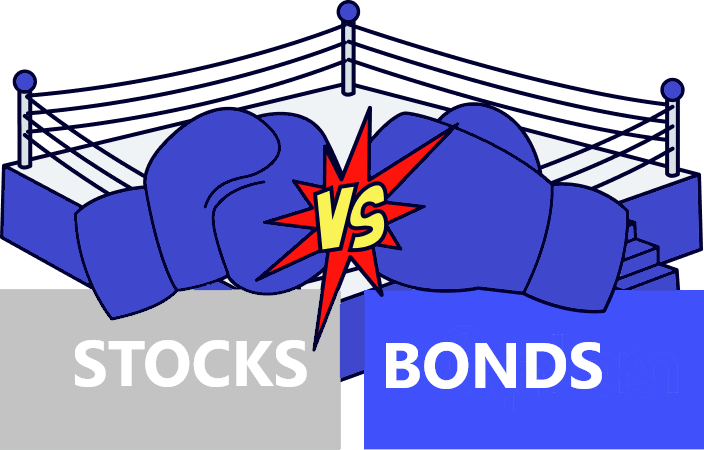
Stocks VS Bonds
How to choose your next investment with intrest rate renewal and inflation of 2023
Stocks and bonds are two different types of investments that have different characteristics and
risks.
Stocks, also known as equities, represent ownership in a publicly traded company. When you buy
a stock, you are buying a small piece of the company and are entitled to a share of the
company's profits and assets. The value of a stock can rise or fall depending on the company's
performance and the overall stock market conditions. Stocks are considered to be riskier
investments than bonds, but they also have the potential for higher returns.
Bonds, on the other hand, represent a loan made to a government or corporation. When you buy
a bond, you are lending money to the issuer and in return, you will receive periodic interest
payments. The value of a bond can also rise or fall, but typically the changes are less dramatic
than stocks. Bonds are considered to be less risky than stocks, but they also have lower returns.
In general, stocks are considered to be a higher-risk, higher-return investment, while bonds are
considered to be lower-risk, lower-return investments. Because of this, it's common for investors
to diversify their portfolios by holding a mix of stocks and bonds.
Here are some advantages of stocks over bonds:
-
Potential for higher returns: Stocks have the potential to generate higher returns than bonds over the long term. This is because stocks represent ownership in a company, and as the company grows and becomes more valuable, the stock price can increase.
-
Inflation protection: Stocks have the potential to provide inflation protection over the long term. As the economy and prices grow, so do the revenues and earnings of the companies whose stocks you own.
-
Diversification: Stocks offer a way to diversify a portfolio and spread risk across different sectors and industries. This can help to reduce the overall risk of an investment portfolio.
-
Liquidity: Stocks are typically more liquid than bonds, meaning they can be bought and sold more easily and quickly. This can be beneficial for investors who need to access their money quickly.
-
Potential for dividend income: Many stocks pay dividends, which can provide a steady stream of income for investors.
Here are some advantages of bonds over stocks:
-
Predictable income: Bonds offer a predictable stream of income in the form of interest payments. The interest rate, or coupon rate, is fixed at the time the bond is issued and typically paid out on a regular schedule.
-
Low volatility: Bonds are generally less volatile than stocks, meaning the value of the bond is less likely to fluctuate significantly. This can be beneficial for investors who want a more stable investment.
-
Less risk: Bonds are considered to be less risky than stocks, as the issuer of the bond is typically a government or corporation with a strong credit rating. This means there is a lower likelihood of default on the bond's interest and principal payments.
-
Diversification: Bonds can be used to diversify a portfolio and spread risk across different sectors and industries. This can help to reduce the overall risk of an investment portfolio.
-
Preservation of Capital: Bonds can provide a way to preserve capital and maintain a steady return, while stocks tend to fluctuate more in value which can result in significant losses.
Effect of inflation
Inflation can have a significant impact on stocks. Inflation is a measure of the rate at which the general level of prices for goods and services is rising, and it can erode the value of money over time.
When inflation is high, it can lead to a decrease in purchasing power for consumers, which can negatively impact the profits of companies. This can lead to a decrease in stock prices, as investors may be less likely to invest in companies that are not performing well.
Additionally, high inflation can lead to an increase in interest rates, which can make it more expensive for companies to borrow money. This can lead to a decrease in investments and expansion, which can negatively impact the stock prices of companies.
However, it's worth noting that not all companies are equally affected by inflation. Companies that are able to increase their prices in line with inflation, such as those in the consumer staples or healthcare sectors, may be less affected by inflation than companies that are unable to do so, such as those in the discretionary or technology sectors.
It's also worth noting that inflation can have a positive effect on some stocks. For example, companies that are involved in commodities and natural resources such as oil and gold can benefit from inflation because the prices of these commodities tend to rise when inflation is high.
Inflation can have a significant impact on bonds as well. Bonds are debt securities that pay a fixed rate of interest to the bondholder, and the value of the bond is based on the interest rate and the length of time until the bond matures.
When inflation is high, it can lead to an increase in interest rates as central banks try to curb inflation by raising interest rates. This can lead to a decrease in the value of existing bonds, as new bonds will offer a higher interest rate than existing bonds. This is because when interest rates rise, the prices of existing bonds decrease, as they become less attractive to investors compared to new bonds with higher yields.
Additionally, when inflation is high, the fixed interest payments on a bond may be worth less in the future, as the purchasing power of the currency has been eroded. This can make bonds less attractive to investors, as they may not be able to keep up with the rate of inflation.
However, it's worth noting that not all bonds are equally affected by inflation. Bonds with longer maturities are more sensitive to interest rate changes than bonds with shorter maturities. Also, bonds issued by governments or entities with a high credit rating tend to be less affected by inflation than those issued by entities with lower credit ratings.
It's also worth noting that Inflation-linked bonds are designed to protect investors from inflation, as their principal and interest payments adjust to the inflation rate.
Read More
-
SCHD ETF Price Forecast - SCHD at $29.14: Dividend Power Play as Markets Chase AI
22.01.2026 · TradingNEWS ArchiveStocks
-
XRP ETFs XRPI and XRPR: $11.06, $15.82 and the Fight to Hold $1.90 on XRP-USD
22.01.2026 · TradingNEWS ArchiveCrypto
-
Natural Gas Futures Forecast - Price Rocket 75% to 2022 Highs on Arctic Blast and Storage Shock
22.01.2026 · TradingNEWS ArchiveCommodities
-
USD/JPY Price Forecast - Pairs Charges Toward ¥159.45 as BoJ Risk and US Data Fuel Bullish Momentum
22.01.2026 · TradingNEWS ArchiveForex


















